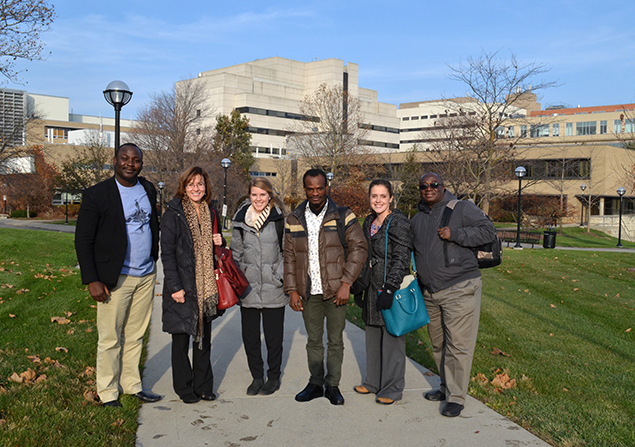The PREventing Maternal And Neonatal Death, or PREMAND, study under Assistant Professor of Learning Health Sciences and OB-GYN Cheryl Moyer catalogued and mapped hundreds of neonatal and maternal deaths across four districts in northern Ghana. Collected over an 18 month period, the information will help local health leaders identify trends and tailor interventions to their communities. Ghanaian project leaders visited Michigan Medicine this fall to discuss the data collected and the final project report. Among them was Raymond Aborigo, a Research Fellow at the Navrongo Health Research Centre, where the Ghanaian study team was based.

“I am very passionate about improving the health of moms and babies. Beyond that, what was interesting me about this project was that it used technologies and techniques that have never been combined and brought them into new areas,” said Aborigo, DPhil, MPH.
The core of the $1.4 million USAID-funded project involved engaging community health workers to collect quantitative and qualitative data about neonatal and maternal deaths and “near misses” (i.e., situations in which someone almost died), and then build that data into mapping software local health and government officials could use to spot trends in real time. Surveyors gathered detailed information about 250 neonatal deaths and 34 maternal deaths, in addition to 104 neonatal and 88 maternal near-miss situations. The study purposely targeted remote areas of the northern Ghana where health infrastructure is scant.
“Among the benefits for us is that, geographically, the project spread beyond the usual areas we work,” said Dodowa Health Research Centre Director John Williams, MD, who led the project team in Ghana. “We had to find people to work in those places and build networks that didn’t previously exist.”
PREMAND has already helped multiple local communities identify mortality hot spots and delve into the causes, many of them cultural and variable by region. A few have even already received small grants to tackle individual challenges, projects such as building new delivery room facilities, adding nursing quarters in the community health center so a nurse can stay with expectant moms overnight, and funding new ambulance vehicles to get moms to the health clinic.
“While we’re still in the final analysis phase of the project, we can say the study allowed for a visualization of where these events are occurring and the factors driving the trends,” said Moyer, PhD. “The maps show where and why people are dying, information that has serious implications for program managers and community leaders who can tailor interventions to their areas, because every community is unique.”

